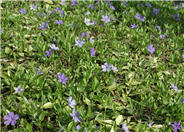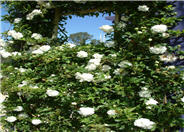
Common name:Dwarf Heavenly Bamboo
Botanical name:Nandina domestica 'Nana Compacta'
The ' Nana Compacta' is a small, rounded shrub that grows from 12"-15" high. Its growth habit is dense, and the leaves become bright red in color in cold, winter areas. It can receive sun to part shade, and is used well as an accent plant.

Common name:Razzleberry Red Fringe Flower
Botanical name:Loropetalum chinense 'Razzleberri'
Red Fringe Flower is a 6'-12' shrub with arching branches and reddish leaves .

Common name:Red-Leaf or Fraser Photinia
Botanical name:Photinia X fraseri
The Photina X fraseri is an evergreen, medium-sized shrub with new foliage that is a glistening, copper red color. It is excellent as a hedge, screen, or accent plant. It should be grown under conditions of sun.

Common name:Blue Atlas Cedar
Botanical name:Cedrus atlantica 'Glauca'
As a large, slow-growing conifer, this tree requires ample room for growth. Its needles are 1" long, and its foliage (needles) is a beautiful shade of silvery blue. In order to develop its best color, the tree needs to be exposed to full sun. It can reach up to 40' tall.

Common name:Myer's Asparagus
Botanical name:Asparagus densiflorus 'Myers'
An evergreen groundcover, the 'Myers' also makes an excellent hanging basket plant when larger in size. Its formal looking fronds have an even, spiral arrangement of leaflets. It is damaged by severe frosts, and looks best with at least occasional watering. -Monterey Bay Nursery

Common name:Columnar Italian Cypress
Botanical name:Cupressus sempervirens 'Stricta'
Italian Cypress is often associated with Italian and Spanish architecture, providing columns in the landscape. They often reach 60' tall. 'Stricta' is compact, columnar and produces long, straight branches with deep green foliage.

Common name:Temari Violet Verbena
Botanical name:Verbena 'Temari Violet'
This perennial will grow 1'-3' tall and has small green leaves with violet flowers that bloom all year.

Common name:Dwarf Vinca or Periwinkle
Botanical name:Vinca minor
This groundcover will grow less than 1' tall and has small, glossy, dark green leaves with blue, purple, lavender, or white flowers that bloom in the spring.

Common name:Crape Myrtle
Botanical name:Lagerstroemia indica
The new leaves of this species are 2" long, bright green, and tinged with bronze. Some cultivars have spectacular fall color. When it has a bare outline, its rounded seed capsules add interest. Its delicate flowers bloom in 6"-12" long clusters. The flower colors could be shades of red, rose, pink, purple, and white, blooming in summer. It thrives on heat, and new cultivars have been created that resist mildew. This tree prefers full sun and has low watering needs once it's established.

Common name:Climbing Rose
Botanical name:Rosa Climbing varieties
With its dark green foliage and fragrant flowers with full and double blooms, this upright shrub is generally grown as a vine or pillar rose. Climbing varieties come in many colors.
The natural world works in cycles. Everything is changing form and moving from place to place in an endless energy exchange system. The leaves and twigs that fall to the ground, not to mention other life forms that might die, decompose and combine with water, air and minerals of the soil to create a medium for future plants.
Click in the green box for more information
Designer:
Photographer: GardenSoft
Maintain a two to four inch layer of mulch on the soil surface to reduce weeds, infiltrate rain water, and reduce compaction.
Drip and other smart irrigation delivers water directly to roots, allowing no excess water for weeds.